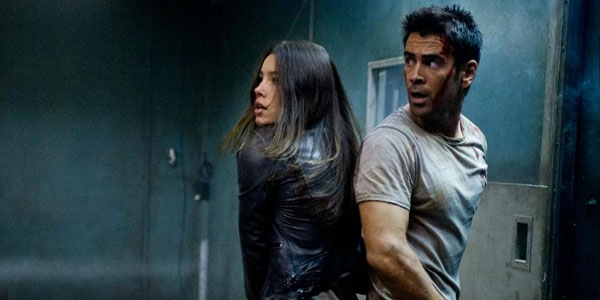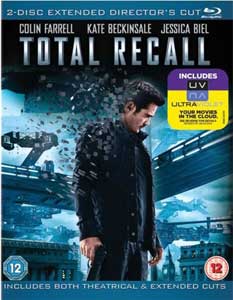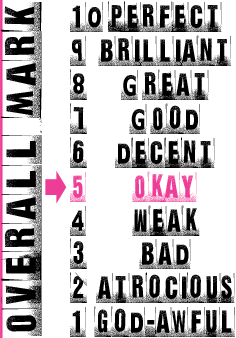
Director: Len Wiseman
Running Time: 130 mins
Certificate: 12
Release Date: December 26th 2012

Len Wiseman was always going to face an uphill battle remaking Total Recall, as the moment the film was announced legions of fans of the 1990 Arnie movie rose up to denounce the very idea of a do-over. They quickly decided the entire thing would be a disaster, a feeling that deepened when it was announced Len Wiseman would direct (the naysayers concentrated on the fact he made the Underworld movies, not that he did a pretty good with Die Hard 4.0). On the plus side though, it did mean that all Wiseman had to do to beat many people’s expectations was produce a movie that wasn’t awful, and he’s just about managed to do that.
He hasn’t made anything particularly amazing, but he has created something that’s slick and slides past your eyes in fairly entertaining if not particularly exciting fashion, even if there’s very little to remember once it’s over. He does this by turning Total Recall in what is basically one very long, special effects filled chase scene, shot as if it was a music video.
There’s no mention of Mars in this one, instead it’s set in a futuristic, apocalyptic Earth, where most of the planet has been rendered uninhabitable. The world is split into two zones that all the people are crammed into – there’s the wealthier but autocratic United Federation of Britain (which is Western Europe) and The Colony (Australia). These two areas are linked by ‘The Fall’, which literally drops people through the centre of the planet.
Douglas Quaid (Colin Farrell) is a factory worker who decides to go a company called Rekall, which can implant memories that allow you to live out your fantasies, without you ever leaving their special chair. However before the implant can take, men storm in and try to kill Quaid, who surprises himself with the fact he apparently knows advanced self-defence and fighting skills. Things get even stranger when he goes home and his wife, Lori (Kate Beckinsale), attacks him and tells him that he isn’t who he thinks he is and that he’s really some kind of spy.
Doug has no idea what she’s talking about, which sets him off on a chase across the globe as Quaid attempts to find out who he really is and what side he’s on – is he fighting for the tyrannical Cohaagen (Bryan Cranston) who may be planning an invasion of The Colony, or has he sided with the resistance, which is battling against the powerful authorities and the chokehold they have on the people? While Cohaagen wants Quaid taken alive, Lori decides he’s too dangerous and so she sets out to kill him. Luckily Doug gets some help from Melina (Jessica Biel), who may have information about his real identity.
There’s a lot that’s the same and a lot that’s different compared to Paul Verhoeven’s 1990 movie. Unfortunately for the new version, it’s similar enough that you’re constantly reminded how much better many things were in the earlier movie, while the differences don’t add enough to make it seem distinct and worthwhile in its own right.
One of the best things about Verhoeven’s version is how it builds its futuristic Earth and Mars from the ground up so that they seem like real, complete societies. Here though everything looks great – it’s a visually impressive movie – but there’s no real sense of the world at large. It’s difficult to know or care what all these people are fighting about, other than getting the impression Cohaagen and his ilk are bad and the plucky resistance are good, but it’s a world that never reaches beyond the edges of the screen and so it’s tough to really get involved with or understand it. It also means that when Cohaagen reveals the convoluted unlikeliness of what’s been going on (or at least what he says has been going in), in the Arnie version it stretched credibility almost to breaking point, while in the 2012 version it feels like it’s throws any sense of reality out of the window.
The film attempts to keep our interest by questioning whether what Quaid is experiencing is real or if it’s all the result of a Rekall implant. However it rather undermines this by having numerous scenes that don’t involve Doug at all. It’s hardly likely anyone would implant memories of events that Quaid’s not present for, so while it’s possible it’s not real, narratively it rather tramples on the mystery.
While Total Recall doesn’t amount to an awful lot, while it’s slipping past your eyes it’s passable enough. As mentioned the movie looks brilliant – if they’d spent as much time creating the society as they did the architecture of the future, this would have been awesome – and as you’d hope, that’s really brought out on Blu-ray, with a pixel-sharp, very good looking picture. Those who hate the overuse of lens flare will find themselves grating their teeth, but others will enjoy the visuals.
The fact it’s an endless chase scene means that there’s always something new happening as Quaid races from one scrape to the next, with Lori always just a step behind. While it’s tough to care too much whether Doug is really a goodie or a baddie, the journey to find out is slickly told. I’m still not convinced Colin Farrell has what it takes to lead a major movie (he’s good in small films but doesn’t really command the screen in a way that holds your interest while millions of dollars worth of special effects are whizzing round him), but he’s good at the action and does a passable job of looking constantly perplexed.
The Blu-ray includes both the theatrical version and a 20-minute longer Director’s Cut, which largely tries to add in a feel for the wider world and the stakes of the conflict. Although the extra scenes attempt to give things a bigger scale, they’re largely window dressing and it doesn’t give the movie the scope it needs. You do get a few scenes it seems odd were removed from the cinema version though, including most of Ethan Hawke’s cameo as the man Quaid supposedly was before he had his face and memories altered. The Director’s Cut is an improvement on the theatrical version, but not so much that it saves the film from being just kind of okay.
There are some decent special features, such as a ‘picture in picture’ Insight Mode which gives an interesting look into the making of the movie. The second disc features various featurettes looking at things such as the action, the design of the movie and ‘Science Fiction vs. Science Fact’. With a gag reel and a few other bits and pieces, it’s not a bad selection at all.
Overall Verdict: This new version of Total Recall is worth a look once, although it’s tough to imagine many people wanting to watch it again after a first viewing. Indeed they’re more likely to want to go back and watch the Arnie version.
Reviewer: Tim Isaac





Leave a Reply (if comment does not appear immediately, it may have been held for moderation)